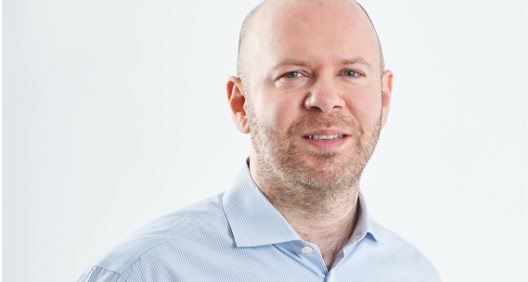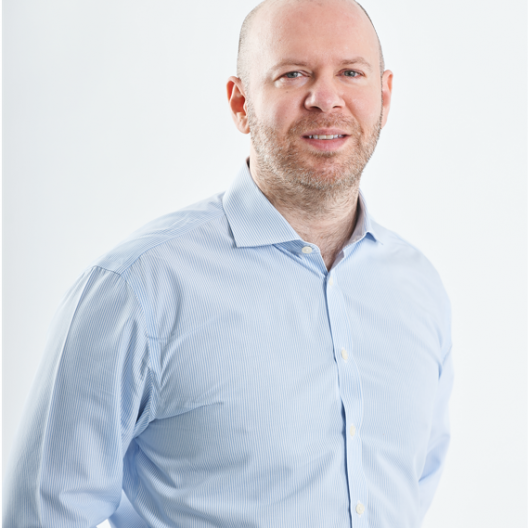‘I went from being petrified to being actively involved in the LGBTQ community in my professional life’
In partnership with myGwork.
By Will Stroude

Words: Louise Sinnerton; Image: Supplied
James Penrose, HR Director at Capgemini speaks to Louise Sinnerton from myGwork about identity, community, and education when it comes to developing others.
James comes from a family with a mixed African and Indian heritage. His grandparents married in the 1930s and faced challenges with this. His mum moved to the UK when Tanzania gained independence in 1961, having been born and raised there. Heritage and race have always been present in James’s life, with many of his family having English as a second language.
“My sister and I appear white on the outside and, growing up, I remember mum getting comments about that all the time. Why did we appear white and our wider family were all Brown and Black?” Playground banter was part of James’s childhood growing up and people made comments about his mannerisms, being ‘gay’, and the way he giggled. “To cope with that, I worked really hard – applying myself at school and being funny was my coping mechanism.”
There were many elements of James’s upbringing that he found hard to cope with. As well as being on the receiving end of taunts about whether he was gay (even before he knew what this was), his family were staunchly Roman Catholic, and James was an altar boy and a reader at church until the age of sixteen. He was also part of the Boys’ Brigade in the Baptist church. Sadly, it was another environment where comments were made about how he was different.
Although his wider family and church put pressure on his parents about going to the Roman Catholic school, James made his wishes clear. He did not want to attend a Catholic school, and nor did he want to go to a single-sex school. These difficult parts of adolescence gave James a window into all sorts of struggles and gave him strong empathy towards supporting people who feel and act differently. James found being a practising Roman Catholic difficult when he started to question his own sexuality, and the comments about that from his wider family. This view is something James is acutely aware of. “Now, seeing how intersectionality is a huge part of employee resource groups in the workplace – as well as how key it is in our HR policies – that is so positive. The BAME community is my family too.” Like many experiences of intersectionality – James’s own story is complex.

James Penrose is HR Director at Capgemini
Understanding he was gay at a young age, James came out to his sister a little later on. When he told her, at the age of nineteen, she was accepting and empathetic. Things with his mum were not quite as smooth. Returning from university in Liverpool for Christmas, James decided it was finally time to be honest with his mum. “I told her I was gay, and she asked me to leave the house that Christmas. It was a really, really difficult time. It was even harder because she had been supportive of a gay friend of mine at school, but with her own son – somehow everything was different.”
James’s grandparents did not want anyone to know that he was gay, but his dad accepted it. His mum worked in community care and was a strong fighter for the underdog. She came around slowly and, by 2005, when she sadly passed away, she had come to ask about James’s partner and had accepted her son.
Away from his family, James started to find his place in the world of work. While at Lloyds TSB, he took part in a Stonewall leadership programme. “In 2001, I started on the graduate scheme there and, in 2003, I started on the leadership programme. It felt like a very positive environment, and I was mentored and coached.” His involvement in LGBTQ+ initiatives and with the community grew from there. While at Vodafone, he helped to set up International Day Against Homophobia and Transphobia (IDAHOT) events across the globe for the LGBTQ+ network.
“I went from being in a phone box and ringing the switchboard of the LGBTQ+ group at university – which I was petrified of calling, let alone going to an event – to being actively involved in the community in my professional life. We only had Nokia [phones] back then. There were no online communities then, just look how far things have come!”
James feels strongly that respecting and taking time to understand and ask about the history and identities of the LGBTQ+ community are key to being a strong ally. Partly thanks to his own family experience and understanding of how different communities relate to one another, he understands how to deal with prejudice and ultimately how these communities can come together to affect change.
“It’s not just about who I am attracted to physically, but it is the community I’m part of – the stigma from the 1980s about AIDS, HIV, and human rights activism are a part of our DNA and sense of LGBTQ+ community. You know there are entire countries and pockets of people where it still isn’t okay to be openly gay, so you need to be aware of that. It’s not just working with one section of society or one type of people. We still need to educate one another so that these pockets don’t exist as siloes and we can all move forward together. The same goes for topics that tend to get less focus, like anti-Semitism for example, we need to make sure that all types of difference are not forgotten and celebrated for success.”
In James’s part of the business, there are people that have transitioned and he’s rightly proud of the supportive environment that he sees in his teams. He knows it isn’t just about the experiences of one or two individuals, and that name-calling still exists and is common elsewhere. “How we educate people on being non-binary and trans is another thing that we need to keep moving forward with. A lot of people don’t understand that being non-binary is protected by law. So, what might be seen by the unaware in society as ‘banter’ can actually be discrimination and have a devastating impact on self-esteem and sense of pride.”
As HR director for Capgemini’s cloud business in the UK, James is currently looking at what the company can do to help accelerate the careers of under-represented groups. He had that opportunity with Stonewall twenty years ago and wants to ensure these programmes gather momentum for the needs of today and tomorrow’s generations.
Capgemini is a proud partner of myGwork, the LGBTQ+ business community.
